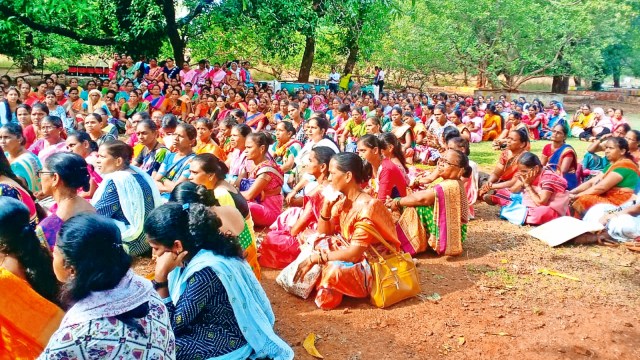‘Court cannot have blinkered vision for paltry remuneration’: Gujarat HC orders increased pay for Anganwadi workers, helpers
The court said the principle of “equal pay and equal work” cannot be applied to AWWs and AWHs or be compared to any other Class-III or Class-IV employees
 The court also noted that despite the top court order on the subject of wages, anganwadi workers and helpers are not being paid minimum wages.
The court also noted that despite the top court order on the subject of wages, anganwadi workers and helpers are not being paid minimum wages. Stating that the duties and obligations of Anganwadi workers (AWWs) and Anganwadi Helpers (AWHs) are “onerous” and “influence the lowest strata of the social fabric”, the Gujarat High Court on Wednesday modified and partially reversed a 2024 single-judge order of the HC that had ruled that the AWWs and AWHs should be treated similar to the regularly selected permanent employees holding civil posts in the State or Central Government.
In its order, Division bench of Justice AS Supehia and Justice RT Vachhani on Wednesday directed the State government departments to, jointly or exclusively, pay the minimum monthly wages of Rs 14,800 over and above of Rs 10,000 to the AWWs, which is a total of Rs 24,800. The sum is less than the fixed pay of Mukhiya Sevika (of Rs 40,800). Correspondingly, the AWHs shall also be paid the minimum wages of Rs 14, 800, in addition to Rs, 5,500, making a total of Rs 20,300, the court order said. The court has ordered that the AWWs and AWHs should be paid the arrears from the Financial Year that commenced in April 2025, within “six months from the receipt of the high court order”.
Stating that the directions would apply to all AWWs and AWHs working in all Anganwadi Centres across the state, without necessitating fresh petitions before the court, the HC said that the principle of “equal pay and equal work” cannot be applied to AWWs and AWHs or be compared to any other Class-III or Class-IV employees. The court order stated, “The onerous and arduous duties and obligations involving pregnant and lactating women and minors, which is unmatched to the duties of other part-time employees… There is also a huge difference between the onerous duties rendered by the AWWs and AWHs and the part-timers employed by other State Departments.”
The court said, “The duties and obligations of AWWs and AWHs influence the lowest strata of social fabric, and their duties cannot be compared to the duties rendered by other part timers engaged for six hours by the State Departments, for whom the policy of minimum wages of paying Rs 14,800 is implemented vide circular dated July 16, 2019. The amount of Rs.14,800 in the said Circular, is fixed from January 1, 2019, considering the minimum wages payable to Class-IV employees.”
The court stated that as per the directions of the Supreme Court in the case of Maniben (supra), the AWWs and AWHs were declared to be holding statutory posts. “… the direction issued by the learned Single Judge to treat them at par with regularly selected permanent employees holding posts either in the Central Government or State Government is fallible, since there is fundamental difference in their source of recruitment. There is also a vast difference in their mode and manner of recruitment, requisite educational qualifications etc…,” said the court.
The court order further said, “The AWWs and AWHs, though can be said to be holding statutory posts, and their appointments are neither illegal nor irregular, they still have to satisfy the mandate of the Gujarat Civil Services Classification and Recruitment (General) Rules, 1967, more particularly Rule 4 and Rule 9 thereof. The AWWs cannot be treated at par with Subordinate Service of Class-III. Similarly, AWHs cannot be considered at par with Inferior Service of Class-IV. Class-III and Class-IV employees in the State Government Departments, after undergoing the recruitment process as prescribed under Rules 9 by the respective departments, are placed in particular pay scales.”
The court also noted that despite the top court order on the subject of wages, anganwadi workers and helpers are not being paid minimum wages. Referring to an affidavit of July 18, 2025, in which the state had showed the data of the entire state, the court order said, “On a perusal of the same, we did not find any increase in the wages of the AWWs and AWHs and their plight remains inexorable, hence, this Court cannot have blinkered vision for the paltry remuneration paid to them.”







